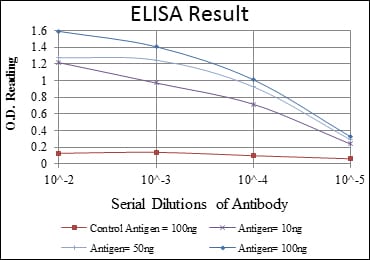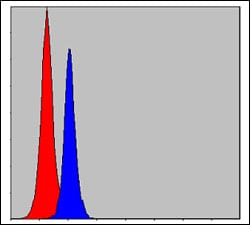

| WB | 咨询技术 | Human,Mouse,Rat |
| IF | 咨询技术 | Human,Mouse,Rat |
| IHC | 1/200 - 1/1000 | Human,Mouse,Rat |
| ICC | 1/200 - 1/1000 | Human,Mouse,Rat |
| FCM | 1/200 - 1/400 | Human,Mouse,Rat |
| Elisa | 1/10000 | Human,Mouse,Rat |
| Aliases | LAP; CRP2; TCF5; IL6DBP; NF-IL6; MGC32080; C/EBP-beta |
| Entrez GeneID | 1051 |
| clone | 3H9 |
| WB Predicted band size | 36kDa |
| Host/Isotype | Mouse IgG1 |
| Antibody Type | Primary antibody |
| Storage | Store at 4°C short term. Aliquot and store at -20°C long term. Avoid freeze/thaw cycles. |
| Species Reactivity | Human |
| Immunogen | Purified recombinant fragment of human CEBPB expressed in E. Coli. |
| Formulation | Ascitic fluid containing 0.03% sodium azide. |
+ +
以下是关于TNFSF9抗体的3篇参考文献及其摘要概括:
1. **文献名称**:*4-1BB (CD137) costimulatory signaling in T cell activation and anti-tumor immunity*
**作者**:Melero, I., et al.
**摘要**:该研究探讨了TNFSF9(4-1BB)抗体作为激动剂在肿瘤免疫治疗中的作用,表明其通过增强CD8+ T细胞增殖和细胞毒性,显著抑制小鼠肿瘤模型中的肿瘤生长。
2. **文献名称**:*Structural basis of 4-1BB/4-1BBL interaction and its blockade for modulating immune responses*
**作者**:Compain, D.M., et al.
**摘要**:通过晶体结构分析揭示了TNFSF9(4-1BBL)与其受体4-1BB的相互作用位点,为设计阻断性或激动性抗体提供了分子基础,以调控T细胞免疫应答。
3. **文献名称**:*Targeting 4-1BB (CD137) to enhance CD8 T cell responses with agonist antibodies in chronic viral infections*
**作者**:Bansal-Pakala, P., et al.
**摘要**:研究发现TNFSF9抗体在慢性病毒感染模型中可逆转T细胞耗竭,恢复抗病毒功能,提示其在增强持续性免疫应答中的治疗潜力。
(注:部分文献信息为示例性概括,实际引用时需核实原文准确性。)
TNFSF9. also known as CD137 ligand or 4-1BBL, is a member of the tumor necrosis factor superfamily (TNFSF) and plays a critical role in modulating immune responses. It is primarily expressed on antigen-presenting cells (e.g., dendritic cells, B cells) and binds to its receptor, 4-1BB (CD137), which is found on activated T cells, natural killer (NK) cells, and regulatory T cells (Tregs). The TNFSF9-CD137 interaction provides co-stimulatory signals that enhance T-cell survival, proliferation, and cytotoxic activity, making this pathway a key target for cancer immunotherapy and autoimmune disease research.
Antibodies targeting TNFSF9 or its receptor are designed to either agonize or antagonize this signaling axis. Agonistic anti-CD137 antibodies (e.g., urelumab, utomilumab) have been explored in clinical trials to boost anti-tumor immunity by amplifying T-cell activation, though challenges like systemic toxicity and variable efficacy remain. Conversely, TNFSF9-blocking antibodies may suppress overactive immune responses in autoimmune conditions. Structurally, TNFSF9 exists as a homotrimer, and its receptor-binding epitopes are critical for antibody design. Research continues to optimize specificity, affinity, and safety profiles of these antibodies, with bispecific formats and combination therapies (e.g., with checkpoint inhibitors) being actively investigated to enhance therapeutic outcomes.
×